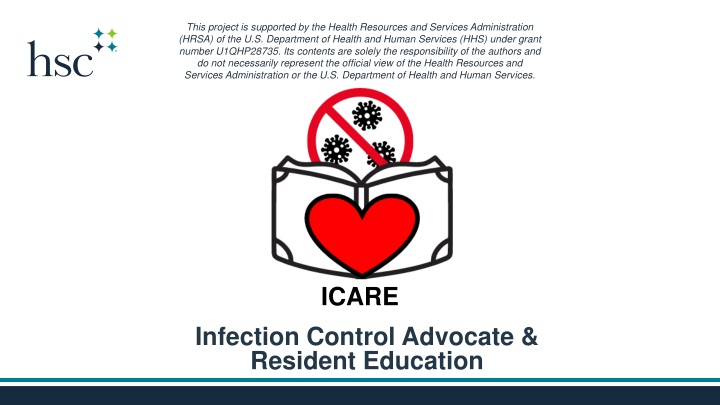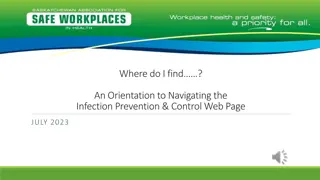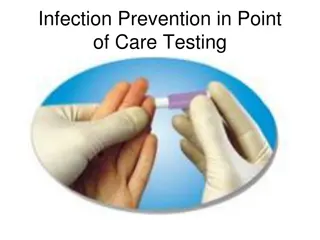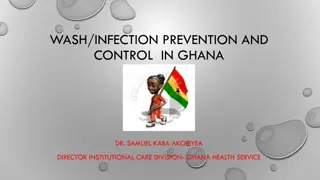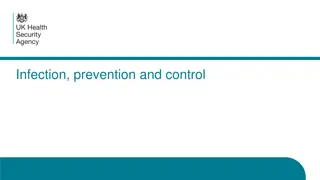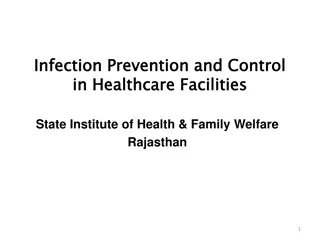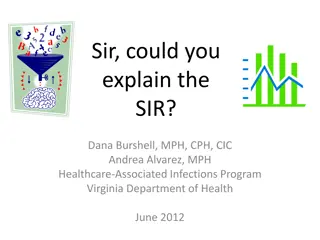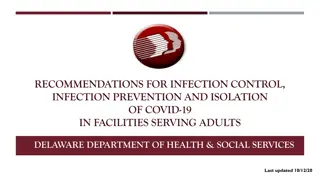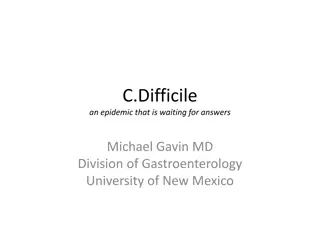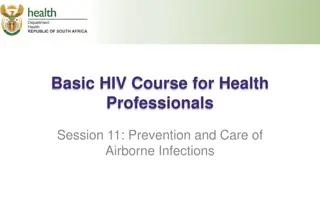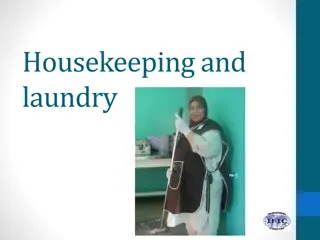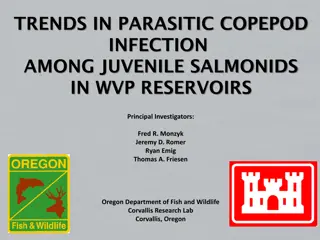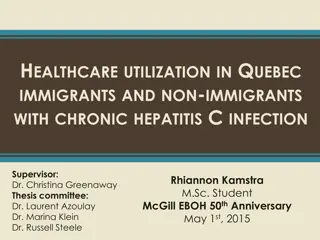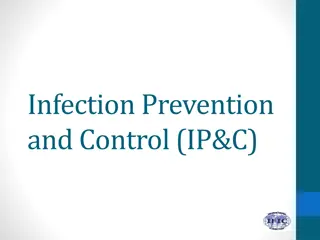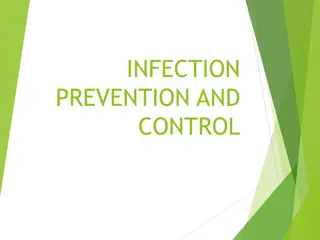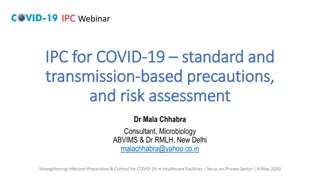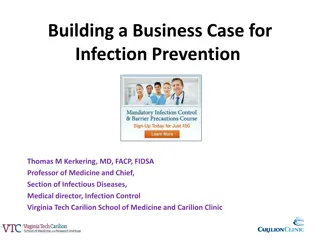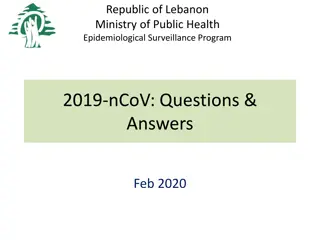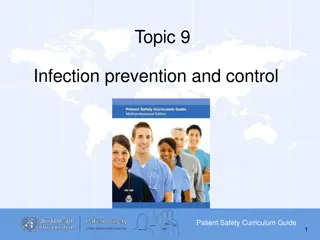Infection Control and Prevention Measures in Healthcare Settings
This project is supported by the Health Resources and Services Administration (HRSA) under the U.S. Department of Health and Human Services. It focuses on educating residents and staff in healthcare settings about infection control, prevention measures, and the use of personal protective equipment (PPE) to prevent the spread of infections. The content emphasizes the importance of hand hygiene, protective gear, communication, and respecting residents' rights while preventing and controlling infections.
Download Presentation

Please find below an Image/Link to download the presentation.
The content on the website is provided AS IS for your information and personal use only. It may not be sold, licensed, or shared on other websites without obtaining consent from the author.If you encounter any issues during the download, it is possible that the publisher has removed the file from their server.
You are allowed to download the files provided on this website for personal or commercial use, subject to the condition that they are used lawfully. All files are the property of their respective owners.
The content on the website is provided AS IS for your information and personal use only. It may not be sold, licensed, or shared on other websites without obtaining consent from the author.
E N D
Presentation Transcript
This project is supported by the Health Resources and Services Administration (HRSA) of the U.S. Department of Health and Human Services (HHS) under grant number U1QHP28735. Its contents are solely the responsibility of the authors and do not necessarily represent the official view of the Health Resources and Services Administration or the U.S. Department of Health and Human Services. ICARE Infection Control Advocate & Resident Education
Infection Control Advocate and Resident Education Gowns, Gloves, and Goggles Precautions for Prevention
Mr. Moore and Mia Hand Hygiene Residents & staff heard, appreciated Possible infection spread stopped!
Mr. and Mrs. Sanchez Mr. Sanchez- concerned for his wife with dementia Drug resistant fungal infection (C. auris) Precautions preventing contact
More Questions from Mr. Moore What special precautions prevent germ spread? What special precautions can be used to help Mrs. Sanchez?
What Will I Learn? What precautions can residents and staff take to protect themselves and prevent germ spread? How can prevention precautions, encourage respect, promote privacy, and support inclusion? How can communication and choice prevent and control infections while respecting resident s rights?
Personal Protective Equipment (PPE) Gowns Gloves Goggles/Face shield Facemasks & Respirators
Putting On & Taking Off PPE Facemask/ Respirator Gowns BEFORE Entry Goggles Gloves Only PPE required for prevention precaution! Facemask/ Respirator Gowns Gloves Exit Goggles
Germ Spread and Prevention Precautions Direct Enhanced Barrier Contact Hugs, kisses, hands Large drops Coughs & sneezes Prevention Precautions Transmission-based More information on PPE and practices Certain situations Most effectively prevent germ spread Indirect Standard Objects in our environment Objects to hands to our eyes, nose, mouth, broken skin Air Very, very small droplets carrying germs long distances and time
Prevention Precaution Basics Enhanced Barrier Precautions Transmission-Based Precautions When? When? Nursing home resident colonized (no signs or symptoms) or at high risk (wound/catheter) How? Reduce multi-drug resistant organisms (MDROs) but not limiting resident movement What? Gowns, gloves, goggle use depends on activities more likely to spread germs like Standard Precautions Resident has or is suspected to be sick from a certain germ (signs or symptoms) How? Based on how germ is mainly spread: contact, droplet, or airborne What? PPE depends on precaution type: Contact- gloves & gown Droplet- facemask & goggles Airborne- respirator (N95 mask) & placement Combo! All limit resident movement catheter care, and dressing Enhanced Barrier When? With all residents & environments- at all times- unknown germ status How? Best judgement on possible situation What? General precautions such as cleaning & disinfection, hand hygiene, safe injection practices, and personal protective equipment (PPE) going to the bathroom, bathing, wound or Transmission-based Standard
Prevention Precautions: Signage Respect Prevents spread and awareness Privacy No private health information released Inclusion Specific type for nursing homes (enhanced barrier precautions)
Quality Care & Resident Rights Personal Protective Equipment (PPE) Putting on and Taking Off Three Primary Prevention Precautions Quality Infection Prevention & Control Infection Prevention & Control Resident Rights Communication and Choice Resident Rights
Resident & Advocate: Rights & Responsibilities Communication Prevention precautions Duration Education Choice Activities
Nursing Home Requirements: Infection Prevention & Control Infection control policies and procedures including standard and transmission-based precautions Strong Infection Prevention and Control Program Least duration and restriction to the resident Federal and State Law Requirements Ensure psychosocial needs during prevention precautions
Ms. Johnson and Mr. Moore Communication Transfer precautions New prevention precautions Choice Activities
Discussion Have you ever used PPE? Did you feel you had the right information or training to use it properly? What can a nursing home do to help you feel more comfortable in using PPE? Have you or someone you know ever used a prevention precaution, such as transmission-based precautions? Were there issues with feeling isolated from others? Have you heard of enhanced-barrier precautions? What do you think of this type of special prevention precaution developed just for nursing homes?
Advocacy: Next Steps Education Nursing home specific policies and procedures Engagement Resident or family council to review policies and monitoring Empowerment Quality assurance and assessment committee (QAA committee) Resident and/or family member role in monitoring
This project is supported by the Health Resources and Services Administration (HRSA) of the U.S. Department of Health and Human Services (HHS) under grant number U1QHP28735. Its contents are solely the responsibility of the authors and do not necessarily represent the official view of the Health Resources and Services Administration or the U.S. Department of Health and Human Services. https://www.unthsc.edu/center-for-geriatrics/education-programs/icare/ ICARE Infection Control Advocate & Resident Education
